
- Homepage
- Era
- 18th Century (11)
- 1900 To 1960 (62)
- 1930s (4)
- 1960s (5)
- 1970s (7)
- 19th (5)
- 19th Century (48)
- 20th Century (15)
- Beautiful Era (12)
- Belle Epoque (49)
- First Empire (9)
- First World War (4)
- Nineteenth (19)
- Nineteenth Century (11)
- Post-war (22)
- Restoration (17)
- Roaring Twenties (28)
- Second Empire (21)
- Second World War (6)
- World War Ii (9)
- Other (3728)
- Language
- Period
- Region
- Subject
- Theme
To See! Very Beautiful Autographed Letter Signed Ernest Renan 1875 3 Pages
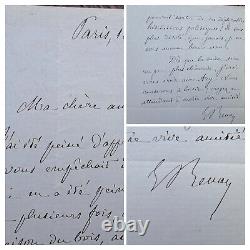
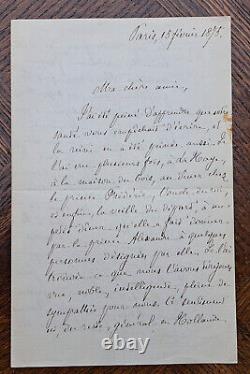
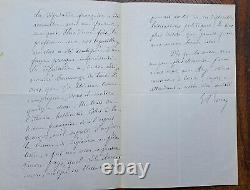
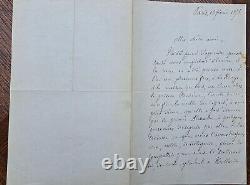
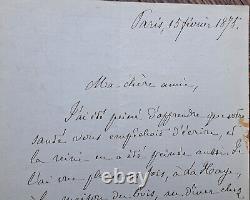
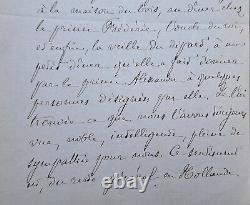
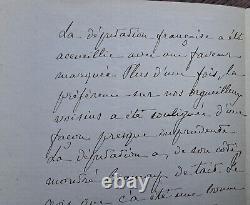
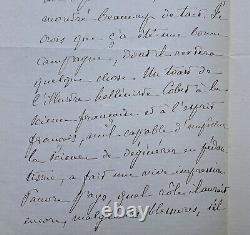
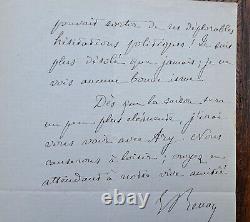
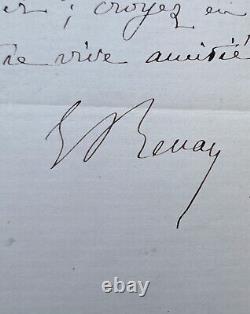


ERNEST RENAN (1823 - 1892). ONE OF THE GREATEST AND MOST FAMOUS FRENCH LITERARY FIGURES AND PHILOSOPHERS. BEAUTIFUL AND INTERESTING SIGNED AUTOGRAPH LETTER OF THREE PAGES, LIKELY ADDRESSED TO GEORGE SAND.
LETTER CONSISTS OF ONE SHEET MEASURING 26.5 CM X 21 CM FOLDED IN HALF VERTICALLY TO FORM TWO LEAVES MEASURING 13.25 CM X 21 CM EACH. LETTER WRITTEN ON THE FRONT AND BACK OF THE FIRST LEAF AND THE FRONT OF THE SECOND LEAF.
THIN AND TEXTURED WHITE PAPER (PHOTOS LIGHTEN THE COLOR). LETTER DATED FEBRUARY 15, 1875, WRITTEN IN RENAN'S HAND AND LOCATED IN PARIS, ALSO WRITTEN BY RENAN. APPROXIMATELY FORTY LINES (+ LOCATION + INTRODUCTION + SIGNATURE) IN BLACK INK. SIMPLE WRITING TO DECIPHER, BEAUTIFUL SIGNATURE. I was saddened to learn that your health prevented you from writing, and the queen was also saddened by it. I saw her several times, in The Hague, at the Maison du Bois, at dinner with Prince Frédéric, the king's uncle, and finally, the day before departing, at a small dinner she hosted at Prince Alexandre's for a few selected individuals. I found her to be what we have always known her to be, noble, intelligent, and full of sympathy for us.This sentiment is, moreover, widespread in the Netherlands. The French delegation was received with marked favor. More than once, the preference over our proud neighbors was emphasized in an almost imprudent manner.
The delegation, on its part, showed a lot of tact. I believe it was a successful campaign that will leave a lasting impact. A toast by the illustrious Hellenist Cobet to French science and the French spirit, the only ones capable of preventing science from degenerating into pedantry, made a strong impression. Poor country, what a role it could still play, despite its wounds, if it could escape its deplorable political hesitations!I am more devastated than ever; I see no way out. As soon as the weather is a bit milder, I will come to see you with Ary.
We will have a leisurely conversation; in the meantime, believe in our strong friendship. A FEW WORDS ABOUT THE CONTENT OF THE LETTER - In February 1875, Renan made a trip to The Hague and Leiden, during which he often saw Queen Sophie. He came specifically for the tercentenary of the founding of Leiden University. As Renan states in his letter, the reception he received was benevolent, sometimes warm: speeches, banquets, receptions at Queen Sophie's or her close relatives. Renan enjoyed great prestige outside of France, and Queen Sophie was one of his great admirers.Renan felt at ease in the Netherlands. Familiar names from the Dutch court are mentioned in this letter: Frédéric d'Orange-Nassau, brother of King William II and uncle of King William III, the reigning king in 1875. Prince Alexandre d'Orange-Nassau, son of William III and Sophie of Württemberg, Queen Sophie, who is mentioned frequently in the letter.
Queen Sophie of the Netherlands had many correspondence with French intellectuals, including Renan. She was very Francophile, and France and the Netherlands maintained very cordial relations, as stated in the letter (to the detriment of England, "our proud neighbors," as Renan says in his letter).
The situation in France in February 1875 is very uncertain, as highlighted by Renan: "Poor country, what a role it could still play, despite its wounds, if it could escape its deplorable political hesitations." After four years of uncertain gestation, the Third Republic was definitively adopted in Versailles in 1875.
It triumphed over the quarrels of the monarchists but struggled to establish itself. The letter is likely addressed to George Sand: Renan was very close to her and was one of the last loyal friends to attend her funeral in June 1876 in Nohant, along with Flaubert, Dumas fils, and others.
In February 1875, George Sand, 71 years old, was already very ill and hardly wrote anymore, as noted by Renan.

